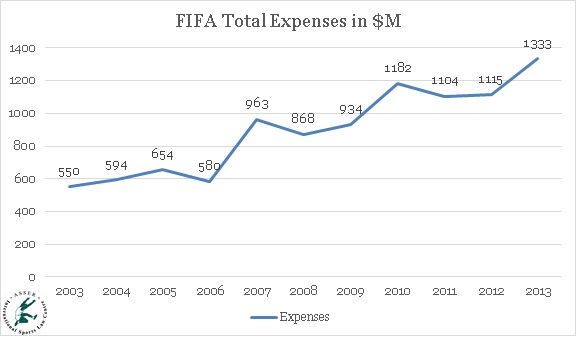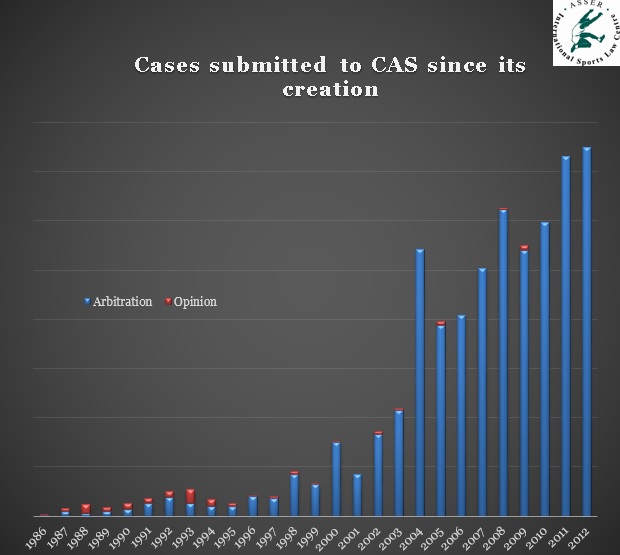In 2009, Sepp
Blatter expressed his concerns that half of the
players participating in the 2014 FIFA World Cup would be Brazilians naturalized
by other countries. The Official list of Players released a few weeks ago tends to prove him
wrong[1].
However, some players have changed their eligibility in the past and will even be
playing against their own country of origin[2].
This post aims at explaining the key legal aspects in changes of national
affiliation and to discuss the regulations pertaining to the constitution of
national sides in general[3]. More...
Our first report on the FIFA business dealt with FIFA’s revenues and highlighted
their impressive rise and progressive diversification. In parallel to this
growth of FIFA’s income, it is quite natural that its expenses have been
following a similar path (see Graph 1). However, as we will see FIFA makes it
sometimes very difficult to identify precisely where the money is going. Nonetheless,
this is precisely what we wish to tackle in this post, and to do so we
will rely on the FIFA Financial reports over the last 10 years.

Graph 1: FIFA Expenses in USD million (adjusted for inflation),
2003-2013.
More...
After a decade of financial misery,
it appears that Valencia CF’s problems are finally over. The foreign takeover by
Singaporean billionaire Peter Lim will be concluded in the upcoming weeks, and
the construction on the new stadium will resume after five years on hold due to
a lack of money. On 3 June Bankia, the Spanish bank that “saved” Valencia CF in
2009 by providing a loan of €81 million, gave the green light for the takeover. However, appearances can be
deceiving.More...
In
April 2014, the Swedish Gambling Authority (Lotteriinspektionen) warned the
organisers of the Stockholm
Marathon that it would impose a fine of SEK 2
million (ca. € 221.000) for its sponsorship agreement with online betting
operator Unibet. The Authority found that the sponsorship agreement violates
§38 of the Swedish Lotteries Act, which prohibits the promotion of gambling
services that are not authorized in Sweden.[1] The
organisers, however, refused to withdraw Unibet as its sponsor and prominently
displayed the Unibet logo at the event, which took place on 31 May 2014. As a
result, the organisers of the Stockholm Marathon now face legal action before
the Swedish administrative courts. More...
This year the race for UEFA Europa League places in Serie A was
thrilling. In the final minutes of the last game of the season, Alessio Cerci,
Torino FC striker, had the opportunity to score a penalty that would have
qualified his team to the 2014-2015 edition of the UEFA Europa League. However,
he missed and Parma FC qualified instead. More...
Pursuant to Kelsen’s famous pyramid, the authority of norms may be
ranked according to their sources: Constitution is above the Law, which is in
turn superior to the Regulations, which themselves stand higher to the
Collective Agreement etc…Under French labour law, this ranking can however be
challenged by a “principle of favourable treatment” which allows a norm from a
lower rank to validly derogate from a superior norm, if (and only if) this
derogation benefits to the workers.
On 2
April 2014, the Cour de Cassation (the French Highest Civil Court) considered that
these principles apply in all fields of labour law, regardless of the
specificity of sport[1]. In this case, Mr. Orene Ai’i, a professional
rugby player, had signed on 13 July 2007
an employment contract with the Rugby Club Toulonnais (RCT) for two sport
seasons with effect on 1 July 2007. More...

Graph 1: Number of Cases submitted to CAS (CAS Satistics)
More...
Yesterday, the press revealed
that the European Commission decided to reject the complaint filed by
Jean-Louis Dupont, the former lawyer of Bosman, on behalf of a player agent
Striani, against the UEFA Financial Fair Play (FFP) Regulations. The rejection
as such is not a surprise. The Commission had repeatedly expressed support of
the principles underlying the UEFA FFP. While these statements
were drafted vaguely and with enough heavy caveats to protect the Commission
from prejudicing a proper legal assessment, the withdrawal of its support would
have been politically embarrassing.
Contrary to what is now widely assumed, this decision
does not entail that UEFA FFP regulations are compatible with EU Competition
Law. UEFA is clearly the big victor, but the legal reality is more complicated
as it looks. More...
The UEFA Club Licensing and Financial Fair Play
Regulations have been implemented by UEFA since the season 2011/12 with the aim
of encouraging responsible spending by clubs for the long-term benefit of
football. However, the enforcement of the break-even requirement as defined in
Articles 62 and 63 of the Regulations (arguably the most important rules of
FFP) has only started this year. Furthermore, UEFA introduced recently
amendments to the Procedural rules governing the Club Financial Control Body
(CFCB) allowing settlement agreements to be made between the clubs and the
CFCB.
On Friday 16 May, UEFA finally published the nine
separate settlement agreements between the respective clubs and the CFCB regarding
the non-compliance with the Financial Fair Play (FFP) break-even requirements. More...
Yesterday, UEFA published the very
much-expected settlements implementing its Financial Fair Play (FFP)
regulations. Today, we address tomorrow’s challenges for FFP, we offer five,
more or less realistic, scenarios sketching the (legal) future of the FFP
regulations. More...